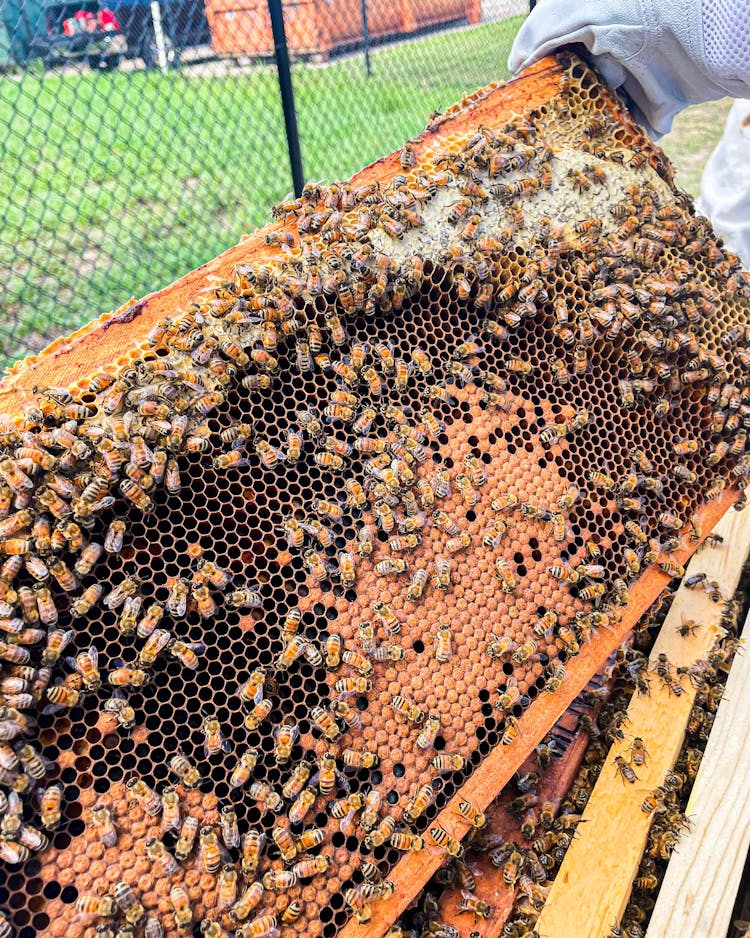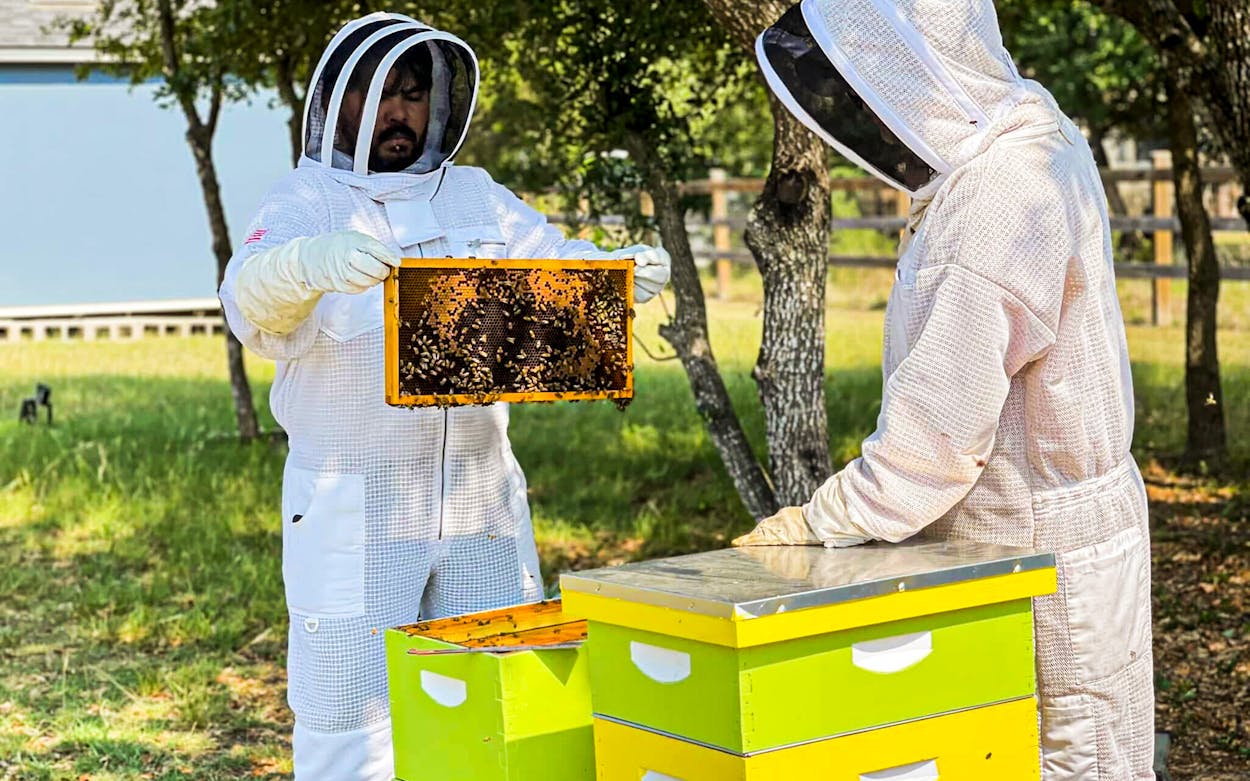On a warm summer morning, Michael Moore and Charlie McMaster don their protective suits and veils to inspect the health of Moore’s four new beehives. The white boxes sit near the fence line of Moore’s fifteen acres outside Evant, a tiny hamlet northwest of Fort Hood. Here, on this undeveloped land, Moore plans to launch a second career in agriculture after his imminent retirement from the Army. A steady breeze sweeps across the treeless slope until it reaches a cluster of pecan trees near the hives. Overhead, flat-bottomed clouds stand motionless in the sky.
The pair approaches one hive, and McMaster, a retired Army colonel and a director for the Texas Beekeepers Association, removes its cover. With a gloved hand, he gently sets aside a Swiffer pad—a DIY defense against destructive hive beetles—and lifts one of the frames to reveal a bulge of golden comb. The bees have begun “drawing out,” depositing wax on the frame’s foundation and building it into cells. In the center of the frame, those hexagonal cells are a rich cinnamon color; they’re what beekeepers call capped brood, cells holding eggs laid by the queen and sealed with a top layer of wax. Nearby, golden cells hold capped honey. At the bottom, a clutch of cells are filled with fat white larvae.
Moore, a trim man with a narrow, tanned face, peers into the box. Behind his veil, his gaze is intense, an affect magnified by horn-rimmed spectacles. A novice beekeeper, he knows enough to interpret the capped brood and larvae as good signs. “So the queen is in there somewhere.”
McMaster nods, his veil bobbing up and down. “This is primo. You’ve got capped honey, you’ve got capped brood, you know the queen is in there and she’s laying.”
A hum thickens the air. Alert to the intruders, bees begin to emerge, darting and whirring as McMaster and Moore work. A few curious explorers land on their suits and veils, but the men ignore them. They move slowly and methodically from hive to hive, assessing each for evidence that the queen is still laying and that pests haven’t invaded. The two have been paired together through Hives for Heroes, a Houston-based nonprofit that helps veterans take up beekeeping by matching them with experienced mentors. The project tackles two disparate problems: the mental health risks that veterans face when they separate from service and the declining population of honeybees. Launched in 2018 by Marine Corps veteran Steve Jimenez, a Houstonian whose rough transition back to civilian life was transformed by beekeeping, the project has expanded to every state and matched more than 1,200 veterans—“newbees,” in the group’s parlance—with beekeeping mentors. About a quarter are in Texas, tending hives in cities, including San Antonio and Houston, and in smaller towns, such as Stephenville and Blue, near Elgin. Another 276 newbee veterans have signed up and await mentors in their areas.


Around 2006, U.S. beekeepers began to report a disturbing observation: in some hives, the majority of the worker bees were disappearing almost overnight. The phenomenon, now called colony collapse disorder, has been associated with pesticide use, invasive pests and parasites, and climate change. A yearly survey by the nonprofit Bee Informed Partnership has documented an average annual loss of nearly 40 percent of colonies nationwide since 2011.
Hives for Heroes aims to increase the number of qualified beekeepers who can tend honeybee colonies, thereby helping increase the number of bees. For the first year of the relationship, most pairs meet at the mentor’s bee yard (Moore and McMaster are an exception). Each veteran buys a suit, gloves, and veil—a $150 investment that Jimenez says helps participants commit to the experience—but works with the mentor’s bees and equipment, significantly reducing start-up costs. As the veterans shadow their mentors, they learn how to gauge the health of a hive by monitoring its activity level and the queen’s laying pattern. They check for pests and parasites and administer treatment. In the dry summer months, they may offer supplemental sugar syrup if nearby nectar sources are depleted. After the first year, the mentor often gifts the new beekeeper a “split,” a portion of bees from a hive that the mentee nurtures as it grows into its own colony. A few of the first veterans to join Hives for Heroes as newbees have now become mentors themselves.
The connection between bees and veterans dates back at least to the First World War. During the war, sugar rationing reinvigorated the demand for honey as an alternative sweetener. As some men returned from combat with disabilities, the federal government created adaptive vocational training programs in beekeeping to help them harness the booming honey market.
In the past decade, multiple groups have revisited this theme. In 2015, Army veteran Adam Ingrao cofounded Michigan-based Heroes to Hives, an intensive beekeeping-education program that positions beekeeping as a way for veterans to protect the country’s food security by safeguarding its pollinators. The same year, the University of Minnesota began a program that offers Bee Veterans beekeeping workshops, complete with mindfulness techniques. Some Department of Veterans Affairs medical centers offer beekeeping instruction through a program that introduces veterans to farming as both a career opportunity and mental health benefit. Ingrao is partnering with the VA on a study of the therapeutic potential of beekeeping for people who are processing trauma.
When veterans leave the military, they face an abrupt and dramatic culture change. Those interviewed for this story describe leaving a highly structured life in which they lived, worked, and sometimes risked their lives with a close-knit group of comrades. In the civilian world, veterans can feel out of step with colleagues and loved ones who didn’t share that experience. Younger military retirees may have a hard time finding a second career, particularly if they have service-related injuries or trauma. These challenges can lead to despair: the Department of Veterans Affairs found that in 2019, the most recent year for which data were available, an average of 17 veterans per day died by suicide. Veterans died by suicide at a rate more than 50 percent higher than that of the equivalent civilian population.
“If the Army is the only thing you ever know, then when you get out of the Army, you have no direction,” Moore explains. “Programs like Hives for Heroes are support systems for veterans to mitigate the potential for suicide by having people feel like they belong.”
Jimenez’s experience leaving the Marines in 2011 was rocky. After his service in eighteen countries as part of Operation Enduring Freedom, the tenor and cadence of civilian life felt alien. How could he talk with his parents, sister, or spouse about what he’d seen? He was succeeding professionally as a business consultant but felt deeply depressed and had trouble imagining a viable future. He turned to alcohol to cope.
Then a friend in Houston invited him to visit some urban beehives. When the beekeeper uncovered a hive, its residents swarmed out to investigate. As bees landed on his suit, Jimenez had no choice but to stay calm and tune out his self-critical inner monologue—a practice he now calls mindfulness. “It completely shifted my mindset, because I was not focused on myself anymore,” he said.
Jimenez threw himself into beekeeping, which, along with therapy, helped him reclaim a sense of purpose. “You’re taking care of something bigger than yourself,” he says. “You actually have responsibility over it; you’re doing this with your friends, and all of a sudden you’re like, ‘Man, I’d rather do that than go to the bar.’ Now you’re in your backyard, now your kids are asking questions, now your spouse wants to help, and all of a sudden you’re creating a healthy family, which ultimately creates healthy communities.”
Hives for Heroes aims to give its novice beekeepers the same benefits. The project harnesses veterans’ desire to be of service—they’re helping the environment, and some volunteer to relocate unwanted colonies from walls and trees—and can lead to a new career. (Though not all beekeepers harvest honey, some do turn the hobby into a business.) The mentor beekeeper—sometimes a fellow veteran, often a non-veteran civilian—is a supportive presence and a connection to the larger beekeeping community. For some combat veterans, the element of danger is an attractive challenge. And all participants develop bee-yard mindfulness out of necessity. If they rush or their minds wander, they’re more likely to get stung.
The newbees who join Hives for Heroes defy easy categorization. They are men and women, with and without disabilities, from multiple branches of the military. Some served for a few years, others for decades. A portion saw combat. Moore, 58, worked in music education before enlisting in the Army in his early thirties as a trombone player in a division band. He became a warrant officer and served as the executive officer for a division band from Fort Hood while deployed in Iraq in 2009, before becoming a company commander for various bands across the United States. For Moore, Hives for Heroes is primarily a training opportunity for his post-military career; in addition to selling real estate, he aims to harvest honey (unlike most newbees, he invested in his own bees and hives) and add chickens, goats, and a truck garden to his land. Moore was never in combat, and he anticipates a smooth shift back to civilian culture. But he remembers the musician in one of his units who retired after twenty years of military service and, suddenly unmoored, ended his own life.
“For me, Hives for Heroes plays a different role than for someone who has been in combat and has trauma,” Moore said. “I was interested because it’s got a military connection and it’s a service to others.” Once his apiary has grown, he plans to share his experience and his bees with a veteran who’s struggling.
At Moore’s beeyard in Evant, McMaster slides the frames back into the last hive. The air has quieted; the men’s slow, deliberate movements have calmed the bees.
“I don’t see any problems,” McMaster says. “You’ve got a couple small hive beetles, but nothing that can’t be addressed. You’ve got one hive that’s maybe a little light, and we may want to requeen it later. But all the hives are good.”
He covers the box, and under the pecan trees, the two soldiers step out of their bee suits. Inside the hives, the work continues.
If you or someone you know is considering suicide or having mental health challenges, please dial 988 to reach the national Suicide and Crisis Lifeline.






